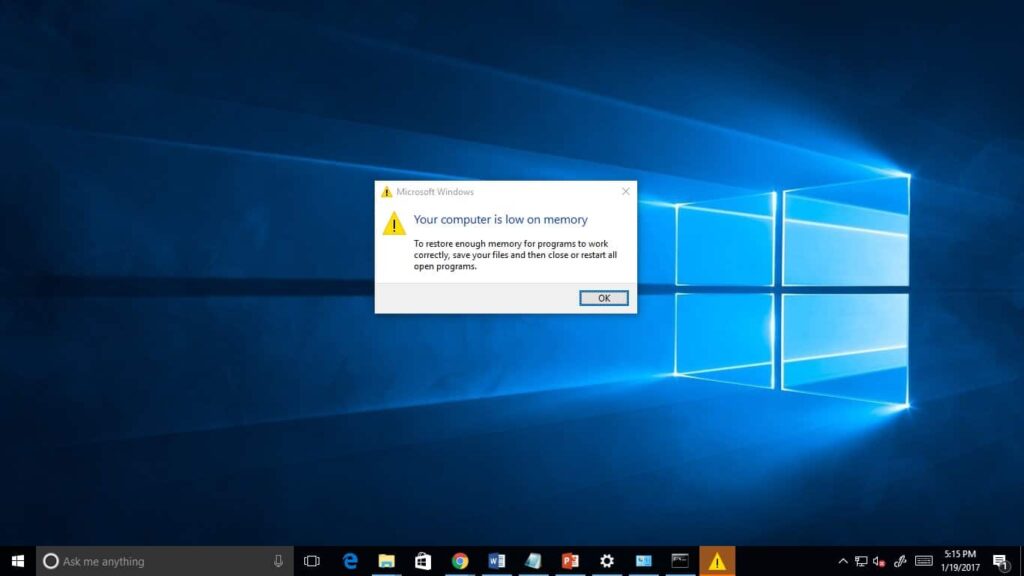Your computer is low on memory warning occurs on Windows 11, when your computer runs out of RAM and becomes low on virtual memory. Low memory warning on Windows 11 can also occur when a program doesn’t free up the memory that it no longer needs. This problem is called memory overuse or a memory leak. When your computer doesn’t have enough memory for all of the actions it’s trying to perform, Windows and your programs can stop working. To help prevent information loss Windows will notify warning Messages like:
Your computer is low on memory
To restore enough memory for programs to work correctly, save your files and then close or restart all open programs.
Causes of Low Memory Warning
This Low memory warning on Windows 11 usually occurs when you’re running Running too many programs at once. Again you may be running resource-intensive programs such as Video editing software, AutoCAD, and Visual Studio that use up all available RAM and cause low memory warnings.
When there isn’t enough RAM for the program you’re trying to run, Windows temporarily moves information that would normally be stored in RAM to a file on your hard disk called a paging file. The amount of information temporarily stored in a paging file is also referred to as virtual memory. When Windows Fails to move information to the virtual memory or Virtual memory Became full windows show the warning message Your Computer Is Low On Memory.
Fix Low memory warning On Windows 11
Let’s first close any programs that you’re not currently using. This frees up RAM and can help alleviate the low memory warning.
Well Sometimes, simply restarting your computer can help clear out any programs or processes that may be using up memory.
In addition, If you suspect that malware or a virus may be causing your low memory warnings, Performing a full system scan with the latest updated antivirus programs can help identify and remove the problem.
Adjust Virtual Memory To Fix Low Memory Warning
If you are getting this error on a regular basis then the best option which you are having is to change the maximum and minimum file size of the paging system (Virtual Memory) which is present on your computer.
- Press Windows key + R, type sysdm.cpl and click ok to open the “System Properties” of your computer.
- Go to the Advanced tab and click on the Settings option. Which is available under the “Performance” section.
- Now On the “Performance Options” window, go to the Advanced tab and click on the Change button located under the “Virtual Memory” section.
- You will see a Virtual Memory window on your computer screen.
- Here you have to uncheck the “Automatically manage paging file size for all drive” option at the top of the same window.
- Select any of Drive letters where you allow to create the paging file and then click on Custom size.
- Then enter custom fields in the “Initial size (MB)” and “Maximum size (MB)” fields.
How To Calculate page file size
To Calculate the pagefile size always Initial size is one and a half (1.5) x the amount of total system memory. The maximum size is three (3) x the initial size. So let’s say you have 4 GB (1 GB = 1,024 MB x 4 = 4,096 MB) of memory. The initial size would be 1.5 x 4,096 = 6,144 MB and the maximum size would be 3 x 4,096 = 12,207 MB.
After Set the Initial size (MB)” and “Maximum size (MB)” Value and click on set, Now Click on the OK button and then on the Apply button to save changes. This will prompt you to Restart the window ” You must restart your computer to apply these changes ”
Now, After restarting Windows, you will Never Receive any Low Memory Warning message on your computer.
Run System Maintenance Troubleshooter
In some cases if a program is force closed, or if something isn’t working properly on your Windows 11 system you might be prompted with the “Your Computer is low on memory” error message. This is happening because Windows is allocating too much virtual memory to the mentioned process, while your system is trying to fix all the problems. For this Once Run the system maintenance tool and check.
- To Run this open control pane – System and Security- Security and Maintenance
- Here Under Maintenance Click on Start Maintenance and wait flew a moment to complete the process.
Use Third-party Optimize Tools
If any corrupt Registry uses high memory this Error can happen. For that better check for the corrupted registry and clean or repair them using free registry optimizer tools like Ccleaner.
- Once you install the Ccleaner Run the program and check for Registry clean.
- Select Scan for Issue and allow Ccleaner to scan, then click Fix Selected Issues.
Increase your Physical RAM
If you still face the same warning message Your Computer Is Low On Memory, your system keeps running on more than 90% RAM you should perhaps install more RAM memory in your system. This is the best and permanent solution to fix Your Computer Is Low On Memory problem for your Windows 11.
To prevent Low Memory Warnings on your computer
- Always Close programs when you’re finished using them.
- Monitor your computer’s memory usage regularly.
- Avoid running too many programs simultaneously.
- Be mindful of the programs you install, and avoid installing unnecessary software.
- Keep your computer clean of malware and viruses.
- Consider upgrading your RAM if you frequently encounter low memory warnings.

